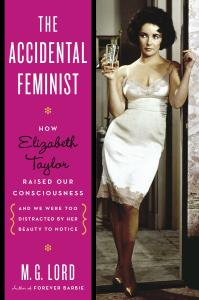Scott Timberg's Blog, page 28
September 16, 2014
What Killed Adulthood? Pop Culture or Capitalism?
ONE of the smarter back and forths over the last week or so has been the response to A.O. Scott’s essay “The Post-Man,” on how genuine adulthood has seeped out of American culture. He’s taken the usual hits for being a nostalgic, entitled, puritanical white man — charges I’m sure he could see coming a mile away — most of which strike me as nonsense.
Scott’s piece is dialectical in the best sense: He’s identified something pretty undeniable, and spends the piece intelligently drifting between celebration and disdain. Is there any other way to view 21st century pop culture? (I’m also delighted to see him drawing on Leslie Fiedler’s wonderful Love and Death in the American Novel.)
As he puts it:
This slow unwinding has been the work of generations. For the most part, it has been understood — rightly in my view, and this is not really an argument I want to have right now — as a narrative of progress. A society that was exclusive and repressive is now freer and more open. But there may be other less unequivocally happy consequences. It seems that, in doing away with patriarchal authority, we have also, perhaps unwittingly, killed off all the grown-ups.
And a bit later:
In my main line of work as a film critic, I have watched over the past 15 years as the studios committed their vast financial and imaginative resources to the cultivation of franchises (some of them based on those same Y.A. novels) that advance an essentially juvenile vision of the world. Comic-book movies, family-friendly animated adventures, tales of adolescent heroism and comedies of arrested development do not only make up the commercial center of 21st-century Hollywood. They are its artistic heart.
Some of this echoes some things David Denby and Lynda Obst have wondered about lately.
The best response I’ve seen so far is from Salon’s Andrew O’Hehir (story here) who agrees with much of Scott’s argument but looks at one major omission.
This fundamental confusion and ambivalence reflects a deep-seated blind spot, I would argue, one that’s endemic to the culture-vulture trade… Well, if Scott gets to play frustrated English professor in his article, I get to play former college Marxist in mine, and insist that sometimes economic forces really do shape the cultural zone. Real wages have fallen since Don Draper’s heyday, especially for American men and double-especially for the middle-class and working-class white men who were once the bulwarks of the mid-century model of adulthood. We now live in a culture (using the word in its anthropological sense) of diminished expectations and permanent underemployment, where many or most young people will never be as affluent as their parents. Lifetime job security is an antediluvian delusion, and in many metropolitan areas home ownership is out of reach for all but the rich. It’s just as useless to object to those changes as it is to complain about grownups reading Harry Potter books, but certainly those things were the essential underpinnings of classic adulthood, and without them it’s no surprise to see the old order fading away.
I say this as a 40ish guy who wears shorts and flip-flops a lot of the time (I live in California) and still go to see rock bands every week or two: This is a case of an argument in which both parties are right.
September 15, 2014
Author M.G. Lord on Culture Crash
Over the next few weeks I’ll be posting the endorsements I get for my upcoming book Culture Crash: The Killing of the Creative Class, due in January from Yale University Press.
With coolness and equanimity, Scott Timberg tells what in less-skilled hands could have been an overwrought horror story: the end of culture as we have known it. He mourns the loss of independent book- and record-store clerks who evangelized for quality. He grieves for artists’ “day jobs,” which allowed creative workers a toehold in the middle-class. CULTURE CRASH is an urgent, necessary book for anyone who has ever been moved by a song, a film, a paragraph or a painting. Without the humanities, Timberg cautions, we may lose our humanity.
M.G. Lord, author of The Accidental Feminist, Forever Barbie, and Astro Turf
From our Departent of Self-Promotion
September 12, 2014
Do Adorno and Benjamin Still Speak to Us?
THERE’s an excellent Alex Ross essay in the latest New Yorker on the Frankfurt School and the rise and fall and perhaps rise again of its reputation. Ross leads this way:
In Jonathan Franzen’s 2001 novel, “The Corrections,” a disgraced academic named Chip Lambert, who has abandoned Marxist theory in favor of screenwriting, goes to the Strand Bookstore, in downtown Manhattan, to sell off his library of dialectical tomes. The works of Theodor W. Adorno, Jürgen Habermas, Fredric Jameson, and various others cost Chip nearly four thousand dollars to acquire; their resale value is sixty-five. “He turned away from their reproachful spines, remembering how each of them had called out in a bookstore with a promise of a radical critique of late-capitalist society,” Franzen writes. After several more book-selling expeditions, Chip enters a high-end grocery store and walks out with an overpriced filet of wild Norweg
ian salmon.
I’ve gone through my own ups and down with these often pessimistic Freud- and Marx-influences critical theorists, and expect I will continue to. I’ll just say for now that while I return to Walter Benjamin every few years, and am always struck by his prose style and the depth of his emotion, I find the unfashionable Adorno sometimes more rigorous in facing up to culture’s complexities. It’s not that I hate pop culture (or jazz!) but some of his stuff is quite smart.
In any case, I wonder, do these thinkers of the ’30s still have anything to tell us about our world today?
September 11, 2014
The Sad State of New Music
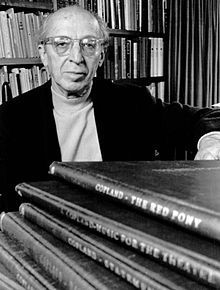
Aaron Copland
THESE days I’m working on a series about commissioning new music — and some of the news is good, offering more and different kinds of options to composers and audiences alike. But this Guardian piece recounting a survey of British composers reminds me how complex, wide-ranging and sometimes depressing the field of composing classical music can be.
One sobering part of the report: The average fee for a music commission was 1,392 pounds. And the vast majority of composers surveyed saw their earnings going down, and about two-thirds said commissions were not a significant part of their income. (These people, by the way, are composers.)
Here’s how the Susanna Eastburn of Brit agency Sound and Music begins her piece:
If we believe that music is a living artform then it stands to reason that the creation of new music is vital to its current and future health. However, professional composers are being asked to create new music for very little money in conditions that are too often inadequate. As a sector we have some hard questions to ask ourselves about our priorities.
I’ll be writing about commissioning in all its dimensions over the next few months.
September 10, 2014
James Ellroy, The Big Picture
HOW does the new Ellroy novel, Perfidia, shape our thinking of his career? How has he changed as a writer? How does he fit in to noir’s history, and has he changed the field? These questions were on my mind while I was writing a recent profile of the edgy novelist, so I asked J. Kingston Pierce, editor of The Rap Sheet crime fiction blog and and lead crime-fiction blogger for Kirkus Reviews.
Pierce, who was recommended to me by LA crime novelist Denise Hamilton, was so damned insightful I felt bad at having to take just a few phrases of his for my article. So here is what was left on the cutting-room floor.
Q: How significant/exciting is it to have a second LA Quartet on its way? Any parallels in literary or noir world? (It’s not quite the same as Tolkien releasing the Silmarillion after the ring trilogy, but gives background to some beloved characters and shows how the LAPD was rebuilt…)
A: There are crime novelists who have gone back to pen prequels to their series (sometimes in short-story form). But I cannot think of another author who has gone back to produce a series of prequels, which is what I understand Ellroy to be doing with his Second L.A. Quartet. The only comparable efforts I can think of come from the Western-fiction genre (Larry McMurtry went back, after writing “Lonesome Dove” and “Streets of Laredo,” to produce two prequels) and television (the BBC series “Endeavour” is a prequel to “Inspector Morse,” which was based on Colin Dexter’s mysteries).
I expect the scope of this Second L.A. Quartet to be sprawling and illuminating. It gives Ellroy the chance to explore the sources of his own characters’ strengths and faults, and to do so against the heightened tensions of World War II. It’s a huge canvas Ellroy has set up for himself, and I expect he’ll make the most of it. He’s learned well how to concoct revealing, labyrinthine journeys into the dark and corrupt heart of America. I anticipate this second Quartet will find a new basement beneath what we already thought was the depth of human and institutional treachery. It should be a haunting ride.
For a lot of folks I know, that original LA Quartet is the heart of his achievement. But maybe that’s a local bias. Does each of his novels have its own significant following?
I have only anecdotal evidence to prove this, but some of his initial novels seem to boast followings distinct from those of his later ones. I’ve spoken with a number of people who take pride in having been early discoverers of Ellroy, back when “Brown’s Requiem,” “Clandestine,” “Blood on the Moon,” and a few other works were the only ones by which he could be judged. Many of these same folks stopped reading Ellroy’s stuff as assiduously after the publication of “The Black Dahlia” and “L.A. Confidential,” when he became more widely popular.
On the other hand, there are certainly fierce followers of the L.A. Quartet, who have never gone back to read those previous books. And other folks who stopped reading his work after “White Jazz.” For many, “The Black Dahlia” and “L.A. Confidential” are the only Ellroy books they’ve read, and they are quite content with that.
I wonder if there’s any sense that he’s lost some of his momentum recently: He has a TV show that went nowhere, his memoir (much of which was quite good, I thought) did not set the world on fire the way My Dark Places did, movies of his work have not matched the success of LA Confidential, and he had a very public affair here in LA w a fellow writer that didn’t end well. Does he seem to be at a funny, maybe vulnerable point now?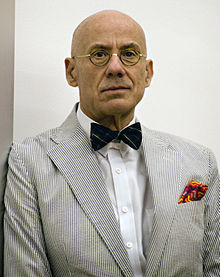
I do think many readers look at Ellroy differently now than they did when he first achieved widespread popularity in the mid-1980s. Part of that is a consequence of the higher profile he’s gained since then. We know more details about his life than we did 30 years ago–more about his boyhood delinquency and his teenage years as a self-described “perv,” his obsession with his mother’s slaying and his troubled relationships with women, his alcoholism and his nervous breakdown–and not all of that has cast him in the most favorable light. When he first began writing, his novels were judged on their own strengths and weaknesses; now we perceive each new book partly through our understanding of his personal life, past and present.
That’s unfortunate, but it’s just the way it is. He seems to revel in the ego-stroking that comes from being recognized, being acclaimed by critics, and being courted by the media and by filmmakers alike. But Ellroy may have exposed himself too much. Perhaps he should turn his back on the limelight for awhile, adopt a lower profile, and let his books speak for him again. They’re probably the best ambassadors he could send out into the world.
To what extent is he a different writer now than he was in the late ’80s? How do his recent books differ from Black Dahlia and the orig quartet?
When Ellroy started out penning fiction, he was laboring at least to some degree in the light of other writers–some of whom he liked, some of whom he probably despised, but all of whose literary efforts had prepared the ground for him to take his own stab at crime-writing renown. Nowadays, Ellroy seems freer than he once did, less influenced by what other authors have tried to do–both in terms of tone and substance–and more influenced by his own successes, his own theories about what works and what doesn’t in crime fiction.
He claims that he doesn’t even read books by his contemporaries anymore, afraid that his work will be affected by theirs.
The downside of living in that sort of bubble may be that he no longer recognizes his stylistic excesses–his often heavy use of short sentences and short paragraphs, and his persistent pessimism. I think Ellroy is a much more confident and forceful writer than he once was, but he’s also a more conscious stylist, prone to overplaying familiar tunes.
Anything in general you’d like to say about his influence and legacy — has he changed crime fiction? — would be useful.
Ellroy has made a huge contribution, I think, in teaching readers about Los Angeles history without actually sitting them down in a classroom, in front of a blackboard. His perspective on that city’s past, while it skews toward the pulpish and corrupt, is nonetheless loving. There’s an honesty to his portrayals of California’s most populous burg that’s often lacking in straightforward history texts.
In addition, he’s a master of creating complex characters–damaged and difficult, but also resilient women who are defined by loss; no less damaged men who carry their scars like chains, and are helpless to escape the dark paths down which those scars lead them. Additionally, he’s done a remarkable job of illuminating characters by their use of slang, by their idiosyncrasies, by their fears that so often leak out sideways, in violent acts. Fictional players like these aren’t his invention alone; he just has a tremendous talent for making readers care about them, even if they don’t understand them.
I don’t know that he’s changed crime fiction so much as he’s given it more realistic resonance and taught others how to do the same. One shouldn’t open an Ellroy novel expecting to be reassured that the world is as he or she believes it to be, for Ellroy is sure to stomp such faiths into mush.
September 9, 2014
The Death of Art’s Third Place
DAVE Hickey has long been one of the orneriest and most original voices in the art world — his book Air Guitar is a revelation — and he recently posted something that hits me almost literally where I live. He’s talking about the disappearance of a discourse around visual art that is neither grounded in academia or the marketplace. Here it is in full:
Here’s one thing that has changed. For most of my life in the art world there was a non-academic intellectual ghetto. No more, of course, but you should remember that this ghetto had within it’s power the ability to invest artworks with intellectual credibility before and other than the accreditation of the market place. This made it possible for young artists to build a reputation prior to their adventures in the marketplace. Numerous magazines published serious criticism of young, non-market- friendly, non-academic artists. This don’t happen anymore. The magazines are run to sell ad-space, the symposia are no longer held, curatorial practice has moved up to first class, and professors will write for nothing, thus denying professional writers publishing venues where they were once welcome. Among the beneficiaries of this intellectual ghetto were Mike Kelly, Richard Tuttle, Steve Prina and many others. The virtue of this coalition was that intellectual dispute was not personal, as it is in academia. I could sit on a panel with Peter Schjeldahl, Jeremy Gilbert Rolfe, Elaine Scarry, Chris Knight, and many others. We could shout at one another for a couple of hours and then go out to dinner, because we were engaged in an intellectual discourse. I miss that, and, now that you know about it, you should miss it too.
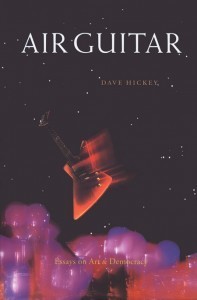 Not only do I agree with this, I think it applies outside the world of visual art: Much of the world of culture had a richer civil society — which included professional journalists, for instance — that kept everything honest and kept corporate power and bad academic prose from dominating. We see it especially in fields like jazz and poetry, but it’s not limited to those.
Not only do I agree with this, I think it applies outside the world of visual art: Much of the world of culture had a richer civil society — which included professional journalists, for instance — that kept everything honest and kept corporate power and bad academic prose from dominating. We see it especially in fields like jazz and poetry, but it’s not limited to those.
(These lines come from his Facebook post; I quote them with his permission.)
Hickey’s latest book is Pirates and Farmers: Essays on Taste, which I’m looking forward to seeing.
September 8, 2014
Elvis Costello at the Hollywood Bowl
OVER the weekend, the former Angry Young Man played the Bowl, alongside indie piano man Ben Folds, both accompanied by the LA Philharmonic. I’m split on the show. Because both artists had equal billing, Costello had to squeeze a career that goes back to the 1970s into an hourlong set. It was too short, and his syncing up with the Phil was uneven — sometimes it worked, sometimes it didn’t.
But Costello, who I’ve adored since I was in high school, was an affable host, and the high points were so good they made me wish I’d been able to come back for Saturday’s show. By the two encore numbers — Burt Bacharach’s “God Give Me Strength,” with orchestra, and a solo-acoustic “Alison” — he was really on fire. He also seemed to be hitting his stride, and I wish he’d been able to sing for another hour.
His songs included classic stuff — “Accidents Will Happen,” “All This Useless Beauty,” “Almost Blue,” with a nod to Chet Baker — and the newish song “Wise Up Ghost.” With a bunch of these — especially “Alison,” which made me think he should have done an entire solo-acoustic set before coming back with the Phil — I was knocked out all over again by Costello’s songwriting genius.
Folds was friendly and charming, and he’s a tuneful enough player. There were even some cool, oddball harmonies in his piano concerto; Folds seems to h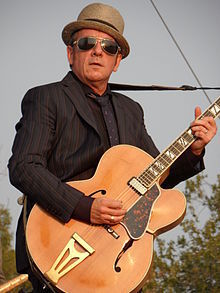 ave remade himself into the indie guy who tours with orchestras, a latter-day pops guy. Little of what he played stuck with me.
ave remade himself into the indie guy who tours with orchestras, a latter-day pops guy. Little of what he played stuck with me.
Folds described the way record labels have disappeared, and the way artists like him now get their support from corporate sponsors like Acura and Panasonic. “They were my Medici family.”
He also praised Angelenos for supporting its orchestra. “We actually need the symphony orchestra — it’s a pillar of civilization. It’s a symbol of people working together.” Folds, who grew up in North Carolina, talked about traveling the country and seeing cities that lacked orchestral groups. “The ones that don’t are crap — you don’t want to go there.” I’m afraid I must agree with much of this.
Here is an approving review by Randall Roberts of the LA Times, and a disappointed review by Ben Wener, formerly of the Orange Co Register.
September 6, 2014
The Wild and Romantic Robyn Hitchcock
ONE of the most unexpectedly delightful records of the year is the new LP by psychedelic Brit Robyn Hitchcock. The former Soft Boy has been moving in a more romantic and understated direction lately, but the album — produced by Joe Boyd, known for his work with Britfolk gods and R.E.M. — took me by surprise. It’s a low-key acoustic collection of half original material and half covers, including the Furs’ The Ghost in You and Roxy Music’s To Turn You On, stripped of their ’80s meringue.
He spoke to me mostly about the album, his creative process, and other musicians he admires. But also said this when describing the huge numbers of musicians — of every generation — all competing for the same attention in a shrinking field:
It’s like the stateroom scene at “A Night at the Opera” by the Marx Brothers. More and more waiters coming and going. “Who ordered the eggs?”, you know? So it’s definitely harder in that respect. You’re certainly not going to be nourished by a record company while you develop your career or keep to being a niche artist because you’re cool.
Here is my interview with Mr. Hitchcock.
September 4, 2014
James Ellroy: The Demon Dog is Back
AFTER completing his Underworld U.S.A. Trilogy and writing a memoir about his often tortured relationships with women, crime writer James Ellroy is back with a new quartet of novels that will serve as a prequel to his Los Angeles Quartet — the four great novels that include L.A. Confidential. 
A few days ago, I hung out with Ellroy at the downtown Pacific Dining Car while he double-fisted coffee, got his car detailed, and talked about the first of the series — the 700-page Perfidia. It includes characters from his earlier novels and documents the hedonistic and fearful weeks that followed the Pearl Harbor bombings. Despite the amped-up tone of the book, on the day I saw the author he was relatively sedate, neither cursing a blue streak nor barking like a dog. (He was surprised — he’s a guy who writes his work longhand and has avoided most of the developments of the last few decades — that his L.A. Times photo would be in color.)
My story is here. Don’t miss Perfidia.
September 3, 2014
An LA Novelist Pleads With Amazon
JANET Fitch, a friend whose writing I admire, has written an open letter to Jeff Bezos of Amazon about what the online bookseller is doing to the literary trade and the the nation’s “intellectual life.” Amazon’s dominance means its decisions matter, she writes: “I’d like this profession of author to remain a possibility for young writers in the future.”
More from the White Oleander/ Paint it Black author:
author:
As a middle-aged woman who has had some luck as a writer, I’d like this profession of author to remain a possibility for young writers in the future — and not become an arena solely for the hobbyist or the well-heeled. What will be lost when working writers no longer can support themselves pursuing their ideas, their art? What will be lost to this country, if these most talented can no longer make a living? I am making this an open letter, because I believe we are at a crossroads, and decisions are being made now which will affect our country permanently.
Here’s the full story.
Scott Timberg's Blog
- Scott Timberg's profile
- 7 followers


